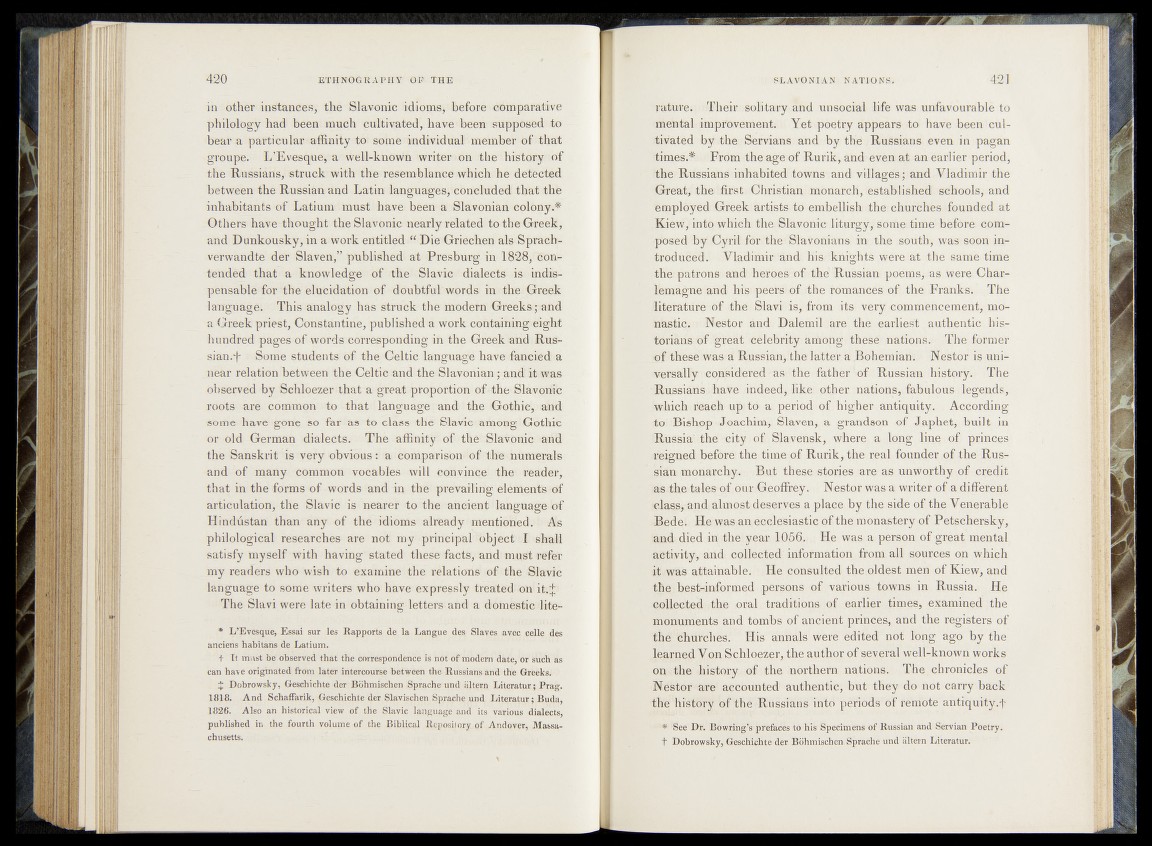
in other instances; the Slavonic idioms; before ^ comparative
philology had been much cultivated, have bee® suppossdto
bear a particular£affinEy tèr^haè individual member of that
groupe. L’Evesque, a well-known writer -on the'!history of
the Russians, struck with the resemblance which he defected
between the Russian and Latin languagespconeluded that thb
inhabitants of Latium must have been a Slavonian colony.*
Others have thought the Slavonic nearly related to the Greek,
and Dunkousky, in a work entitled “ Die Griechen alsSpraeb-
verwandte der Slaven,” published at Presburg in:1828/con-
tendéd that a knowledge of th e t Slavic dialects is indispensable
for the elucidation of doubtful'words in t thei Greek
language. This analogy has struck the modern Greeks ; and
a Greek priest, Constantine, published'a work containing-eight
hundred pages-of words corresponding in the Greek and Rus-
sian.d ■ Some students of the Celtic language have fancied a
near relation between the Celtic and the-Slavonian; and' ifcwas
observed by Schljoezer that a great proportion of^the^SlayoÄ
roots are common to that 1 language r and the Gothid^ and
some have-gone so far as to class- th& Slaviclanaoiig - Gothic
or old German dialects. The affinity" of thedäterteome'-and
the Sanskrit iswery obvious-a* comparisbnÄftfMsii numerals
and of many common vocables - will eohyineefthe1 ®eader,
that in the forms of words and in the prevailing element’s ^
articulation, the Slavic is nearer to the ancientHanguage b f
Hindustan than* any of the idioms alieady<pp^ttefcdefefiils
philological researches are note my'principalObject c?I shall
satisfy thy self with having'stated’ these facts, arid mitet refer
my read ^s who wish to examine the relations of the -Stevie
language to some writers who have expressly treated*.on!iti^S
The Stevi were late itt obtaining letters afid a défaëgffeilite--
* L’Evesque, Essai sur les Rapports de la Langue des Slaves ayec celle des
anciens habitans de Latium.
i + It must be" observed that the correspondence is not of modem date, or such as
can have originated from later intercourse between the Russians and the Greeks.
% Dobrowsky, Geschichte der Böhmischen Spracheundältern Literatur; Prag.
1818. And Schaffarik, Geschichte der Slavisch.cn Sprache und Literatur; Buda,
1826. Also an historical view of the Slavic language and its various dialects,
published in the. fourth volume of the Biblical Repository, of Andover, Massachusetts.
radSttfen ; Their soli tary and unsocial life was unfavourable to
mental 'improvements Yet poetry appears to have been cul-
ti’slated bf vtfee:*.Servians >..audr‘l>|g the' Russians even in pagan
times.*. . From the age of Rurik, and even at an earlier period,
tthe Russians inhabited towns and villages; and Vladimir the
Great, the first.«•(ihristian monarch, established schools, and
bmployedGreek artisteto embellish the* churbhes -founded at
Kiew) into which the Slavonic liturgy,? some time'1 before composed
by Cyril for th eS la vonian& in-..the south, was soon in-
-feroduced. Vladimir ’indfe Kisdkmghits were at the same time
-th'eipatrons and heroes-jof-the Russian poems,.as were Char-
Jbmagne and his?,'peerisiof tbe romances, of the Franks. The
literature-of th e , Slavifis/from its very commencement, mo-
nastiq.'ir;K»estor and Dalemil -are, the earliest ^authentic his-
toriari&'of ^reat celehrity temoiig these nations. The former
o f ’theseiwas a Rjissianjfthe la tl^ ia Bohemian: Nestor is universally
considered *aS;f the father*of Russian history.. Thp
Russians . have indeed*. like/, other ,nations,t fabulous legends,
Is^ e h iisa e h up t o ^ pejpod of higher antiquity. , According
•to Bishop Joachim, Slaven, a grandson of Japhet, built in
(Russia''.thd~city oftfSla.veftsk, where a.,long line.of princes
«feigned before the time of Rurik, the real founder of the Russian.
monarchy. But these.atories. are as unworthy of credit
asJrhe taleaofoar Geoffrey. Nestor was a writer of a different
ielass/andjalmostf deserves*,a place by the side of the YiOerabMf
JBede. He was an, ecclesiastic of the monastery of Petschersky,
(insd died in the:year 1 0 6 ^ He was. a.person.of great mental,
activity, arid Collected "information from all1 sources op which
i t was attainable. He consulted the oldest men of Kiew, and
the-, best-informed • persons pfe various towns in Russia. He
collected the oral traditions of, .earlier timgs, examined the
monuments and tombs of ancient princes, and the registers o f
fliO churches; His aliMls were gifted not long ago by the
learned Ypn Sphloezer, the author of several weil-known works
on v the history of the northern nations. The chronicles of
Nestor are accounted authentic; but they do not carry back
the history of the RusstehS into periods of remote antiquity.f
* 'See Dr: Böwrlng%‘prefaces töhl^'Specimens'of Russian and Servian Poetry,
f Dobrowsky, Geschichte der Böhmischen,Sprache und altern Literatur.